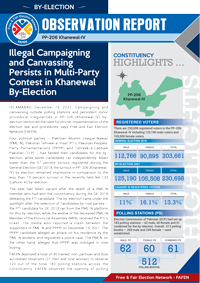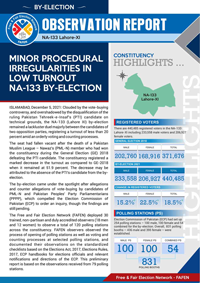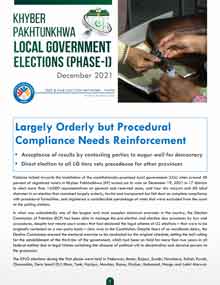Khanewal by-election had been a contest between four political parties. FAFEN witnessed illegal campaigning and canvassing.
ISLAMABAD, December 16, 2021: Campaigning and canvassing outside polling stations and persistent minor procedural irregularities in PP-206 (Khanewal-IV) by-election reinforced the need for stricter implementation of the election law and procedures, says Free and Fair Election Network (FAFEN).
Four political parties – Pakistan Muslim League-Nawaz (PML-N), Pakistan Tehreek-e-Insaf (PTI), Pakistan Peoples’ Party Parliamentarians (PPPP) and Tehreek-e-Labbaik Pakistan (TLP) – had fielded their candidates for the by-election, while seven candidates ran independently. Albeit lower than the 57 percent turnout registered during the General Election (GE) 2018, the turnout in PP-206 (Khanewal-IV) by-election remained impressive in comparison to the less than 19 percent turnout in the recently held NA-133 (Lahore-XI) by-election.
Khanewal By-Election: PML-N, PPP Trade Allegations
The seat had fallen vacant after the death of a PML-N member who had won the constituency during the GE-2018 defeating the PTI candidate. The by-election came under the spotlight after the selection of candidates by rival parties – the PTI candidate for GE-2018 ran from the PML-N platform for this by-election, while the widow of the deceased PML-N Member of the Provincial Assembly (MPA) received the PTI’s ticket. The media also reported a clash between the supporters of PML-N and PPPP on December 15, 2021. The PPPP candidate alleged an attack on his residence by the PML-N workers, and registered a police case. The PMLN, on the other hand, alleged that PPPP was indulged in vote buying.
FAFEN deployed a total of 30 trained, non-partisan and duly accredited observers (21 men and nine women) to observe 120 out of the total 183 polling stations across the constituency. FAFEN observed the opening of polling stations as well as voting and counting processes at selected polling stations, and documented their observations on the standardized checklists based on the Elections Act, 2017, Elections Rules, 2017, Election Commission of Pakistan’s (ECP) handbooks for elections officials and relevant notifications and directions of the ECP. This preliminary report is based on the observations received from 82 polling stations – 45 percent of total polling stations.
7 FAFEN Observers Barred From Observation
According to FAFEN observers, the election-day remained peaceful with no major incident affecting the voting and counting processes. However, seven FAFEN observers were barred from observing the electoral processes – six from the counting and one from the voting processes. The six observers restricted from the observation of counting processes were stopped by the Presiding Officers, while one was barred by the security officials. At one polling station (PS-70), the Presiding Officer continuously interrupted the observation of an accredited observer.
As part of FAFEN’s observation, the observers interviewed three voters outside each observed polling station after they cast their ballots to gauge their satisfaction with the voting process. In PP-206 (Khanewal-IV), all 222 voters interviewed by FAFEN observers expressed their satisfaction with their voting experience.
According to FAFEN observers, one of the most common illegalities remained the campaigning and canvassing by candidates around the polling stations, which has also been a most occurring issue in other elections. FAFEN observers reported campaigning and canvassing outside 85 percent (69 polling stations) of the observed polling stations. Such campaigning and canvassing around polling stations at times also becomes a source of election-day violence due to intense competition and may also create an atmosphere of intimidation for voters.
Khanewal By-Election & Scarcity of Polling Material
At 29 percent (23 polling stations) of the observed polling stations, the Presiding Officers had not removed the campaigning materials on their outer walls. Moreover, at four polling stations, observers reported campaign material pasted inside the polling stations’ premises. At two polling stations, the observers reported scarcity of the polling materials, which may have led to delays in the voting processes. The Presiding Officer at one polling station did not also seek signatures of polling agents on Form-42 (statement regarding inspection of ballot boxes before start of poll) after showing them empty ballot boxes before the start of polling as required by the law. Similarly, at two polling stations, the Presiding Officers did not show the empty ballot boxes to the polling agents.
At two polling stations, the observers reported that voters were not allowed to vote despite possessing the original National Identity Cards (NICs). Similarly, at two polling stations, the Assistant Presiding Officers (APOs) were observed to have not been stamping the back of the ballot papers while issuing them to the voters. The APOs were also observed to not sign the back of the ballot papers at five polling stations. Such ballot papers are excluded from the count at the time of counting at the polling station, and later rejected by the Returning Officers during the consolidation of results’ proceedings.
At one polling station, unauthorized persons were observed to be present inside the polling booth. With the exception of an observation from one polling station, the security officials were observed to be treating voters in a courteous manner, and performing their duties in accordance with the ECP code of conduct.
Covid SOPs Cast Aside
Though the ECP had instructed the polling staff to comply with the Standard Operating Procedures (SOPs) for containing the spread of the Corona Virus Disease 2019 (COVID-19), at 43 percent (32 polling stations) of the observed polling stations, the COVID SOPs were not duly followed or ensured by the election officials. Similarly, at 41 percent (32 polling stations), the poster exhibiting COVID-19 safety protocols to apprise voters of the SOPs was missing.
Overall, the ECP had set-up 183 polling stations – 62 male, 60 female and 61 combined – in the constituency, comprising 512 polling booths – 268 male and 244 females. The Elections Act, 2017 encourages the Returning Officers to assign not more than 1,200 voters to any polling station, and not more than 300 per booth. However, as many as 97 polling stations exceeded the legally encouraged scheme including 39 male, 20 female and 38 combined polling stations.
Khanewal By-Election: Multiple Booths in Single Room
Despite clear instructions by the ECP, the Presiding Officers at 28 polling stations had set-up multiple booths in a single room. Such practices lead to overcrowding during voting rush hours, especially during high-turnout elections. In addition, the mismanagement of polling stations along with a higher number of voters assigned to a polling station at times leads to chaos and disorder, which slows down the voting, and may also cause voter suppression as many voters turn away to avoid unnecessary wait or untoward situations.
As many as 230,698 voters – 125,190 men and 105,508 women – were registered to vote for the by-election, as compared to 203,661 in GE-2018, registering an increase of 27,037 voters – 12,424 men and 14,613 women voters.
The PP-206 (Khanewal-IV) consists of areas including Christian Colony, Green Town, Railway Colony, Basti Haqnawaz (Old Khanewal), Hakeemabad, Azeem Town, Islam Park, Khokarabad, Raheem Town, Shadab Town, Basti Abbas Nagar, Jaswant Nagar, Faisal Town, Afzal Town, Kahnewal Kohna, Shamkot, Jamesabad, Mahni Sial, Kot Molchand, Veer Garh, Nanak Pur, Hayatpur, Solgi, Zakhira Khanewal, Mohallah Bilal/Tariqabad, Marzipura, Kot Alla Singh, Mehngi Wali Pulli, Makkah Town, Faisal Town, Kot Muhammad Hussain, Madina Town, Khurram Pura and other suburbs.
To download complete report, click here




